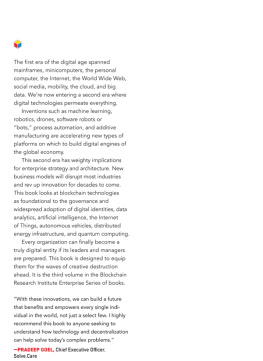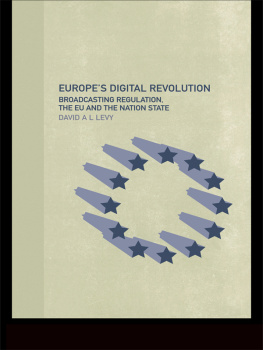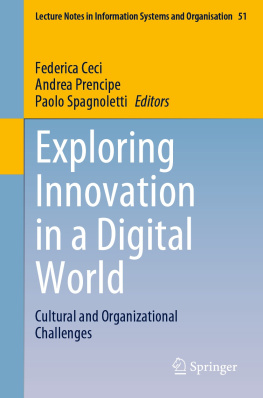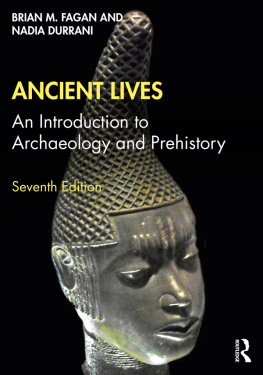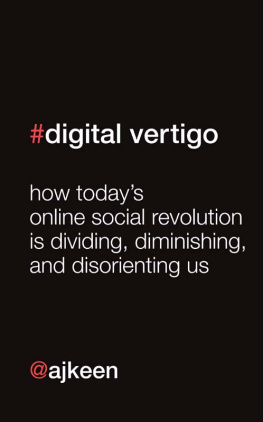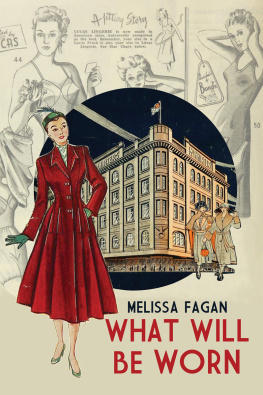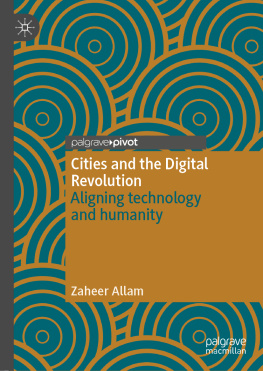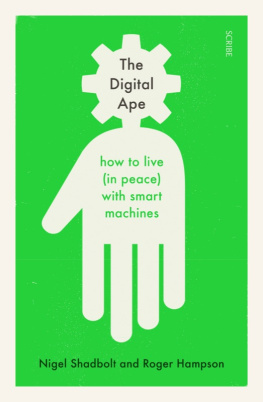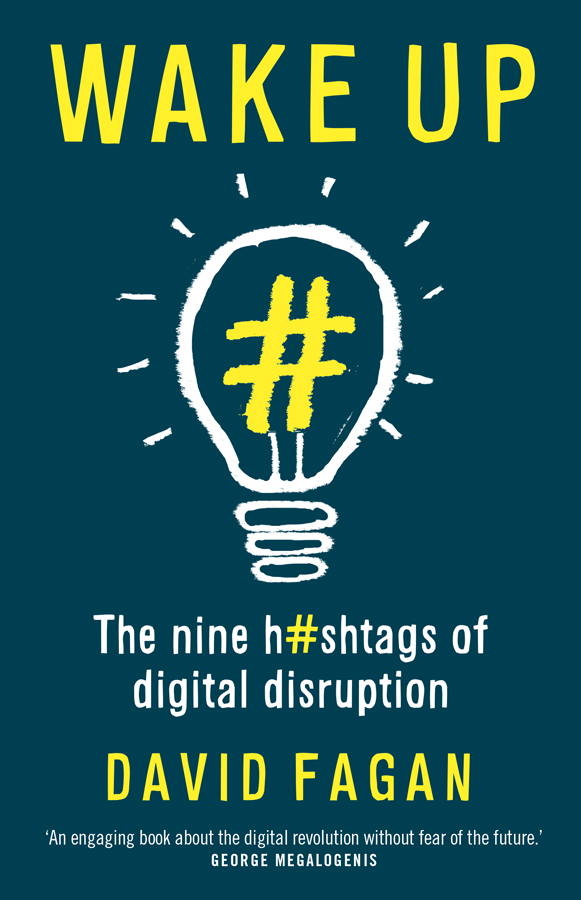David Fagan has lived and breathed the digital revolution for almost two decades first as editor-in-chief of The Courier-Mail , designing and driving one of the biggest online news sites in the country, and now as Director of Corporate Transition and an Adjunct Professor of Business at the Queensland University of Technology. In this role, he uses his breadth of experience to run the Real World Futures program, which is dedicated to exploring and explaining how digital disruption is changing how we think, work and live. The Brisbane-based father of three is also a convert, of course, to Uber, Airbnb, social media, online shopping and drone racing.
CONTENTS
To Jeff Fagan, who taught me to value the future
AUTHORS NOTE
M Y -YEAR-OLD ASKED recently about what life was like when I was her age. She wondered if I thought then (like she does now) that everything had already been invented. I thought for a few seconds and told her certainly not.
When I was 12, man had just landed on the moon. The future looked rosy for kids who wanted to space travel, and I had no doubt that during my lifetime we would all be dropping into the moon for a visit. We might even live there. But it wasnt just the prospect of flying to the moon that convinced me more was to come. It was the boundaries wed pushed to get to that point. If we could fly through space, I believed, we could do just about anything.
Indeed, in the 45 years since the Apollo program was abandoned we have achieved a lot. Technology has given us a better understanding of the planet and its place in the universe. Its given us new ways to learn, travel and cure ourselves, and also offers ways, if we choose to use them, to mitigate the demands that our growing population places on Earths finite resources.
Advances in technology have changed our lives in ways I couldnt possibly have imagined. For example, when I was a child, I was herded into a school hall to watch the lunar landing on a black and white TV. Recently, my children were captivated by the American presidential elections and watched the progress of the count on their phone screens. This may not seem surprising but only because the process that turned our telephones into our personal TV stations, movie theatres and bank terminals has been gradual.
Ive seen firsthand how these incremental changes have impacted on traditional business models and organisations and also the way it has influenced our personal behaviour, affecting our daily habits and lifestyles. My perspective on these digital transformations is entirely non-technical. I have spent most of my life as a journalist and editor working on a large metropolitan newspaper and covering stories on the trends that shape society in the political, business and cultural spheres and trying to understand the changing needs of consumers who were finding new ways to get their news and entertainment as online media channels opened up. That newspaper, The Courier-Mail , was one of the worlds most profitable early in the century and moved quickly to embrace digital technology although not as quickly as the businesses that seemed to come from nowhere to better serve the lives of readers and advertisers who left the traditional broadsheet newspapers, in some cases after decades of loyal readership.
I now work in higher education in a senior position guiding digital strategy and running programs that educate and advocate change readiness. As an executive immersed in digital change I have gained many insights into emerging technologies and how governments, organisations and businesses are adapting to these changes for some the possibilities offered by developing technologies are a boon, while others have not been so lucky.
And its not just in the office. Every bit of my life, and the lives of my friends and family, are being changed by technology whether its the endless parade of teenage selfies, the access to just about any song or book ever written or recorded, the ability to discover any piece of trivia that has ever been noted, or the reconnection through social media with friends lost for decades.
This is entering a new phase. Artificial Intelligence (AI) allows computers to draw from existing patterns to anticipate how you want to behave, and what you might want to do next. This already happens when a message on a phone tells you how far it will take to get to a destination you regularly travel to. En masse, the same technology can analyse the data of millions to quickly solve a problem they might not even know they have.
All the evidence suggests we are still early in this change process. Im sorry, Siena, you are wrong to think everything that can be has already been invented. But youre entitled to make mistakes at 12, just as I did in thinking I would go to the moon. Because the future always holds great promise and its the downpayments we make on it today that decide how much of it we can realise. This book is about the future and how to identify those downpayments that will reap tangible benefits for ourselves, those around us and broader society.
It has been written and curated from hundreds of sources and dozens of personal experiences of people who are using the technology as a stepladder into the future. Just as art curators dont paint or sculpt but draw together exhibitions, curation has become the buzzword of digital media. It acknowledges the breadth of sources readily available online to paint a picture of whats going on with just about anything.
I first heard the term used at a high-level executive meeting early in the decade, when my former employer News Corporation was trying to fashion a digital strategy. Ironically, we were in a New York meeting three subway stops from some of the best museums in the world when one of the visiting experts encouraged us to think about how we curated, rather than created, our products. I was sitting beside the then Wall Street Journal editor (now CEO of News Corporation), Robert Thomson, a Dickensian figure with a huge brain and a mischievous humour. He picked up the newspaper I was editor of and started to make little dusting motions over its pages, as if it was a museum piece that needed tending by its curator. We thought it funny, yet its time as a museum piece was a lot closer than we could have imagined. We just werent awake to it.
Overwhelmingly, it seems the big trends in emerging technologies are in place if we want to be alert to them. The surprise factor may turn out to be Blockchain, the secure digital ledger which allows its users to enter and track every transaction behind what they are buying and selling.
In the ensuing pages I traverse the worlds of social media, driverless cars, online retailing, travel, education, health and the consequences of the great sin of any age, denying reality.
This is not a technology guide. Its a guide for how to think about the world as we head toward the third decade of the 21st century, and a reminder that the signals for what is to come are already in place if we care to look.
David Fagan, October 2017
INTRODUCTION:
A DIGITAL TALE
I N 2004, J ESUS A PARICIO WAS an 18-year-old out celebrating the normal teenage rites of passage shared around the planet when disaster threatened his young life. Jesus was on the road, away for the weekend from his Seville home, away from the diet of TV, sport, beer and junk food that somehow sustains young men through their growing years, when his friend Juan ran their car off the road. Juan and the two other passengers suffered broken limbs. Jesus survived, too, but went into a coma that kept him detached from the rest of the world for more than a decade.



